
Saturday, December 30, 2006
Eid Mubarak!

Friday, December 29, 2006
Standing at Arafat
According to a hadith in At-Tirmithi, the Prophet (saws) recommended this dua for the day of Arafat
 Laa 'ilaaha 'illallaahu wahdahu laa shareeka lahu, lahul-mulku wa lahul-hamdu wa Huwa 'alaa kulli shay'in Qadeer.
Laa 'ilaaha 'illallaahu wahdahu laa shareeka lahu, lahul-mulku wa lahul-hamdu wa Huwa 'alaa kulli shay'in Qadeer.
None has the right to be worshipped but Allah alone, Who has no partner. His is the dominion and His is the praise, and He is Able to do all things.
Today would also be a good day to re read the Prophet's last sermon, which was delivered today at Arafat in the year 10 A.H., or 632 A.D.
"O People, listen well to my words, for I do not know whether, after this year, I shall ever be amongst you again. Therefore listen to what I am saying to you very carefully and take these words to those who could not be present today.
O People, just as you regard this month, this day, this city as Sacred, so regard the life and property of every Muslim as a sacred trust. Return the goods entrusted to you to their rightful owners. Treat others justly so that no one would be unjust to you. Remember that you will indeed meet your LORD, and that HE will indeed reckon your deeds. God has forbidden you to take usury (riba), therefore all riba obligation shall henceforth be waived. Your capital , however, is yours to keep. You will neither inflict nor suffer inequity. God has judged that there shall be no riba and that all the riba due to `Abbas ibn `Abd al Muttalib shall henceforth be waived.
Every right arising out of homicide in pre-Islamic days is henceforth waived and the first such right that I waive is that arising from the murder of Rabi`ah ibn al Harith
ibn `Abd al Muttalib.
O Men, the Unbelievers indulge in tampering with the calendar in order to make permissible that which God forbade, and to forbid that which God has made permissible. With God the months are twelve in number. Four of them are sacred, three of these are successive and one occurs singly between the months of Jumada and Sha`ban. Beware of the devil, for the safety of your religion. He has lost all hope that he will ever be able to lead you astray in big things, so beware of following him in small things.
O People, it is true that you have certain rights over your women, but they also have rights over you. Remember that you have taken them as your wives only under God's trust and with His permission. If they abide by your right then to them belongs the right to be fed and clothed in kindness. Treat your women well and be kind to them, for they are your partners and committed helpers. It is your right and they do not make friends with anyone of whom you do not approve, as well as never to be unchaste...
O People, listen to me in earnest, worship God (The One Creator of the Universe), perform your five daily prayers (Salah), fast during the month of Ramadan, and give your financial obligation (zakah) of your wealth. Perform Hajj if you can afford to.
All mankind is from Adam and Eve, an Arab has no superiority over a non-Arab nor a non-Arab has any superiority over an Arab; also a white has no superiority over a black nor a black has any superiority over white except by piety and good action. Learn that every Muslim is a brother to every Muslim and that the Muslims constitute one brotherhood. Nothing shall be legitimate to a Muslim which belongs to a fellow Muslim unless it was given freely and willingly. Do not, therefore, do injustice to yourselves. Remember, one day you will appear before God (The Creator) and you will answer for your deeds. So beware, do not stray from the path of righteousness after I am gone.
O People, no prophet or messenger will come after me and no new faith will be born. Reason well, therefore, O People, and understand words which I convey to you. I am leaving you with the Book of God (the Quraan) and my Sunnah (the life style and the behavioral mode of the Prophet), if you follow them you will never go astray.
All those who listen to me shall pass on my words to others and those to others again; and may the last ones understand my words better than those who listen to me directly. Be my witness O God, that I have conveyed your message to your people.
Eid Takbir
Thursday, December 28, 2006
Watch Hajj
Hajj in the video news
BBC - Hajj begins
CNN - Hajj, the essential journey - looks like they have a new video up for every day.
Wednesday, December 27, 2006
Things to learn and Rape
I would like to get more in depth into aqidah, especially the hadith of Gabriel. I would love to develop a course for converts based on this hadith. I mean, this hadith has everything a muslim should know, and yet, I didn't know about it for several years. Maybe I just haven't been reading the right stuff. *shrugs*
I would like to explore tasawwuf. So much of the materials aimed towards converts lean heavily on the fiqhi aspects of Islam, halal and haram, don't do this, don't do that. All of that is well and good, but something is lacking. When I envision what I want my deeny life to be, I want it to be a deep relationship with the Almighty, my Lord (swt). While following God's laws are certainly a part of that, it doesn't fill me. My husband isn't a big sufi fan, despite having some sufi sheikhs in his family tree. But, I'm slowly working on him ;)
And, although I'm a wee bit exhausted from the "don't do this, don't do that" Islam that I've been following since I converted, I would like to delve deeper into Islamic Jurisprudence. I'm a quasi-paralegal (do the paralegal work without the title) and in the future, I'm thinking of going to law school. Law and the development of law fascinates me. I never knew how complex the laws of the United States were, especially case law. While studying for my paralegal certification, I spent many a Saturdays in a local law library. The first time I went, I stood in awe at the thousands upon thousands of books full of court decisions, all interpreting and fleshing out US law. While we have the basics - the US consitituion and the US code, it's the case law that really makes things complex and exciting.
Islamic Jurisprudence is the same. There are our basics, the Qur'an and the Sunnah of our Prophet (saws), and then we thousands upon thousands of books and scholars who interpret this. It would be fascinating to delve deeper into the issues that are presented as so black and white to converts - don't do this, don't do that - and study the sources and the commentary over history...
...which brings me to the article that I was originally going to blog about. Can you tell I tend to ramble? Shaykh Faraz Rabbani is uber spiffy. He teaches several courses on Sunnipath, as well as many of the free lectures they do from time to time. He answers a question on witnesses for rape that leaves my mind racing - what is the history of rape laws in islamic jurisprudence? What influences it and how has it changed over time? I'm definately going to have to look up Mufti Taqi Usmani's work on this. I think it's floating somewhere out in cyberspace. I'm definately going to play around in english works for the time being, but I really need to dedicate myself to serious arabic studies. Bah.
Q. If a woman is raped, does she have to bring up 4 witnesses to get the rapist convicted? If so, what is if she gets pregnant. Will she get punishment since juridicaly she is guilty of adultery? And can modern technics be used in order to proof that she was being raped. I read somewhere else, that she has to bring up 4 witnesses, but it seems very unlikely, since if there were 4 witnesses theese would obviously done something to help her. Can u please bring some light into this whole complicated topic.
A. Walaikum assalam wa rahmatullah,
I pray this finds you in the best of health and spirits. This is a common myth about Islamic criminal law. Rather, the four witness requirement applies only to the prescribed hadd punishment (which in the case of a married person could be death and for the non-married, 100 lashes). [Marghinani, Hidaya] This punishment is only applied in very rare cases, as is clear, and is meant to be a social deterrent, above
all.As the classical and contemporary jurists (such as Mufti Taqi Usmani) have made clear, a rapist can be convicted on lesser evidence (including scientific evidence, such as DNA tests and medical reports) for discretionary punishments. These discretionary punishments are left up to the legal system to determine.
However, it is a myth to say that Islam would in any way condone rape, or allow a rapist to go free for this terrible crime against an innocent human being and against society.
And Allah alone gives success.
Faraz Rabbani
Images of Hajj
And now it's hajj, so I will once again live vivaciously through pictures of pilgrims as they are in the midst of what is probably the highlight of their lives. I apologize for the formatting below. No matter how many times I fix it, it just goes right back to looking silly.
Ya Rabb, may my husband and I get to make hajj soon inshaAllah!
Monday, December 25, 2006
Dhul Hijjah continues
Anywho, last year, Sunni Sister put together a fantastic list of readings about Dhul Hijjah. Go, read. After all, iqra was Allah (swt)'s first command.
Welcome the Blessed Month of Dhul Hijjah
Saturday, December 23, 2006
Art of the Pen
Penmanship is a spiritual geometry fashioned by a material
instrument
The art of Islamic penmanship is a bridge between the spiritual and material; the visual and the verbal. It is a living tradition that has the capacity for self-renewal enabling Soraya Syed to adopt a contemporary approach while remaining true to her artistic heritage and the many years of study linking her to the calligraphy masters of the past...FOR EVERYTHING THERE IS A CURE AND THE CURE OF (AILING) HEARTS LIES IN THE REMEMBRANCE OF GOD
Friday, December 22, 2006
Ah, moon issues once again
 The biggest moon fight usually occurs a few days before Ramadan, and then a few days before Eid al Fitr. This year was especially exciting, as we added a new dimension to the usual local sighting vs. international sighting debate with the Fiqh Council of North America declared that they were following calculations rather than physical sightings.
The biggest moon fight usually occurs a few days before Ramadan, and then a few days before Eid al Fitr. This year was especially exciting, as we added a new dimension to the usual local sighting vs. international sighting debate with the Fiqh Council of North America declared that they were following calculations rather than physical sightings.Spiritual Goals
That got me thinking. I'm worrying about my physical health, but what about my spiritual health? I mean, it's great to take care of my body in the dunya, but what have I done for myself in the akhira? Why not make a chart to track religiously oriented goals?
So, here are the things for my spiritual health chart:
Salat - 5 times a day, inshaAllah add some sunnah once I have everything set with my fard.
Dhikr - write in whatever I do that day. I don't really have a problem with avoiding dhikr. I love it.
Listening to Qur'an - I subscribe to a spiffy Qur'an weekly podcast that has the Qur'an recitation in arabic followed by a decent reading in english. I try to listen to some each day on the bus ride to and from work, so why not track it?
Reading Qur'an - I've been reading through the 30th Juz of the Qur'an, reciting the arabic as well as I can, followed by the english and then reflecting on Muhammad Asad's commentary. I think however, I'm going to start from the beginning, and read a few pages each day inshaAllah.
There are a ton of variations on this - one could track the components of salat, to check that they're doing everything correctly, follow their sunnah fasting, or they could track a Qur'an memorization goal. I think for the moment though, I'll stick with these 4 things, things I already do, but would like to create a habit for and do more.
One of the things I hope to accomplish to to actually see and realize how well (or not) I am doing in deen-y oriented things I've been saying I will do. I know I read some Qur'an, I know I listen to some on the bus, I know I pray, but how much do I miss? If it's there, on a chart, on the front door to the house, I have to face my shortcomings several times a day. inshaAllah then I can improve.
inshaAllah I'll keep this up, and hopefully post updates on how I'm progressing.
Thursday, December 21, 2006
The Hajj

Wednesday, December 20, 2006
Karen Armstrong on NPR
This past October, she published a new book on the Prophet, Muhammad: A Prophet for our Times. You can read an excerpt from the book and listen to an interview with Ms. Armstrong at NPR.
Tuesday, December 19, 2006
First 10 days of Dhull-Hijja
While 2 million muslims are in Saudi Arabia, eagerly waiting to complete their hajj, for those of us at home, we can still reap some rewards and benefits from the first 10 days of this month. Fasting these first 10 days are a sunnah (an example) of our blessed Prophet (saws). In addition, doing good deeds and extra worship are held in even higher regard during this time.
Ibn `Abbas (ra) reported that the Prophet (saws) said: "There are no days in which righteous deeds are more beloved to Allah than these ten days." The people asked, "Not even Jihad for the sake of Allah?" He said, "Not even Jihad for the sake of Allah, except in the case of a man who went out, giving himself and his wealth up for the cause (of Allah), and came back with nothing." (Reported by Al-Bukhari)
Visit IslamOnline for more articles on these 10 days. Mutmainaa lists acts of worship and activities that are perfect to at this time.
Monday, December 18, 2006
1000 words - to be revised
My husband sent me these pictures and asked what my thoughts were on them.



In looking at these pictures, the most interesting thoughts that come to my mind aren't my impressions of the pictures. Rather, I think about what my fellow americans must think when they look at these pictures.
I've mentioned before how I am fatigued after spending several years as the muslim apologist on Christian Forums. In addition to my stint there, I've also lurked in the right wing blogosphere for ages. Forums like F-r-ee Re-pu-blic, S-ea-n Han-nit-y Message board and Rapture Ready, blogs like D-e-bb-ie S-ch-l-u-ss-el and Mich-elle M-a-lk-in (names divided so they hopefully won't search me out and blog about me) have me gripped in morbid fascination. Some will claim that they only are mad at radical muslims, while others will drop the PC stuff and openly declare their hatred of all things islam related. I haven't decided which I dislike more, because at least the latter is honest, while the former shows through their postings that no one outside of Salman Rushdie fits their definition of a non radical muslim.
I've become fatigued from my paroosal of the right wing blogosphere as well. I pretty much know what they will say before they say it. For example, the incident with congressman elect Keith Ellison of Minnesota is the perfect example. Search for Ellison and takbir or Ellison and Akbar to find examples of the kind of hatred that permiates sections of the right wing. The typical response was a hysterical piece of "OMG, there are terrorists in Minneapolis, listen to them chanting Allahu Akbar OMG!!!!1111!!1!!" What really happened is that many muslims were excited about the prospects of a muslim running for congress. Several worked hard and put in a lot of hours participating in their first politial campaign. At the end of a long and hard campaign, Keith won, and the muslims expressed their delight in a natural way - by making takbir. Takbirs (saying Allahu Akbar, God is greater) permiate muslim life. We say them in our daily prayers, in rememberance of God, and in appreciation for something good. So of course, Allahu Akbar is natural. But no, Allahu Akbar is only a terrorist call, and heaven forbid anyone do some actually study to find out some real information.
How do I know they weren't terrorists, one might ask? I was there. I made takbir. I ain't no terrorist.
Examples of this are rife in the right wing blogosphere. It's sickening. Can you tell I'm just a wee bit bitter?
So, what does this have to do with the pictures? Sadly, when I look at those pictures, I immediately think about what the right wing loonies would say in reaction to them. I worry about a good muslim and a good american being slandered all around the internet. I worry about the place of muslims in america. I worry.
Think Deeply... Where Are You?
Nermin Abd El-Moniem at IslamToday
Prayer is the second pillar of Islam. The Arabic word for prayer (salâh) derives from the word (silah) which means "a connection". Prayer is the best way that we can make contact with our Creator and seek His guidance and support. Essentially, prayer is our main route to attaining Allah's pleasure, and it is the first thing we will be asked about after death.
Since Islam is the religion of all humanity, it encourages us to be successful and ambitious and to work hard in order to achieve the best for ourselves, our communities, and for humanity as a whole. Also, Islam urges us to better ourselves in the various aspects of our daily lives, including our worship of Allah. On the Day of Judgment, Allah will ask us about our deeds, and we will be punished or rewarded according to the quality of those deeds.
Allah says: "To any of you that chooses to press forward, or to follow behind – Every soul will be (held) in pledge for its deeds." [Sûrah al-Muddaththir (74): 37-38]
In light of this, all Muslims are obligated to try to be proficient and successful in their various walks of life – as students, workers, doctors, craftsmen…etc. Moreover, we should remember that we do not seek success for our worldly lives only, but also for our lives in the Hereafter. Likewise, we have to try hard to attain higher degrees of excellence in our worship.
Accordingly, the five daily prayers are not just a duty or a habit for Muslims, but they are a daily and direct connection between us and Allah. In other words, they are our helpline that we use five times a day to give our hearts and souls the guidance that they need.
It is not easy for me, or for any of us as Muslims, to train ourselves to wake up daily before dawn in order to pray the Fajr prayer. It is also not easy to drag ourselves away from life's hectic schedule so we can always pray the rest of the five prayers on time. Yet, do we ever ask ourselves if Allah has accepted our prayers or not? Do we ever ask ourselves how we might improve the performance of our prayers?
In fact, I had never asked myself any of these questions until after reading the following words of Imam Ibn al-Qayyim (rahimahullâh). He writes:
Mankind, with regard to the performance of their prayers, are on five levels:
- The First: This is the level of one who is negligent and wrongs his soul. He is the one who falls short in performing wudû' properly, performing the prayer on time and within its specified limits, and in fulfilling its essential pillars.
- The Second: This is the level of one who guards his habit of offering his prayers on time and within their specified limits, who fulfils their essential pillars and performs his wudû' with care. However, his striving (in achieving the above) is wasted due to disturbances in his thoughts during prayer that distract him and turn his attention to other preoccupations and concerns.
-The Third: This is the level of one who guards his prayers within the specified limits, fulfils their essential pillars and strives within himself to repel the disturbances in his thoughts and extraneous concerns. He is busy struggling against his enemy (Satan) so that Satan does not steal from the prayer. Because of this, he is engaged in (both) prayer and struggle (jihad).
- The Fourth: This is the level of one who carries out the prayer, completing and perfecting its due rights and essential pillars, who performs it within its specified limits and with his heart fully engrossed in safeguarding its rights and specified limits, so that nothing of his prayer is wasted. His whole concern is directed towards its performance, its completion and its perfection – as it should be. His heart is immersed in the prayer and in servitude to his Lord, the Exalted.
- The Fifth: This is the level of one who carries out the prayer like the one mentioned above. However, on top of this, he has taken and placed his heart in front of his Lord, looking towards Him with his heart in anticipation, filled with His love and His might, as if he sees and witnesses Allah. The misgivings, thoughts and preoccupations have vanished and the veil between him and his Lord is lifted. The difference between this person and others with respect to the prayer is greater than the distance between the heavens and the Earth. This person is busy with his Lord, delighted with Him.
The people whose performance of prayer is at the first level will be punished, those at the second will be held to account, those at the third will have their sins and shortcomings expiated, those at the forth fourth will be rewarded, and those at the fifth will be close to their Lord, because they will receive the portion of the one who makes his prayer the delight and pleasure of his eye. Whoever makes his prayer the delight and pleasure of his eye will have the nearness of his Lord made the delight and pleasure of his eye in the Hereafter. He will also be made a pleasure to the eye in this world, since whoever makes Allah the pleasure of his eye in this world, every other eye will become delighted and pleased with him.
From that time on, I started to ask myself: Where am I? Will I be punished or rewarded? How can I reach the 5th level?
Sunday, December 17, 2006
Wiping the slate clean? Getting back to praying regularly
From Sunnipath
Q. If someone I know used to pray regularly 5-times a day, but then over a period of time, started to get less and less motivated about salat to the point where they seldom pray, what practical advice could I give them that would help them pray regularly again? They get discouraged when they actually sit down and write down which salats they have to make up because the list gets so long. So what practical steps could this person take to start praying regularly again?
A. Bismillah al-Rahman al-Rahim:
It is good to "count one's blessings" when one feels discouraged. Oftentimes the discouragement is not warranted and is lifted through certain mental habits that shoulder spiritual effects by permission of Allah.
Among these habits is to give thanks to Allah for creating us; to give thanks for creating us as a human being of sound mind and body; to give thanks for creating us as part of the last and best Umma; to give thanks to Him for cherishing and sustaining us at all times, even - or especially - in the depth of distress from which we call to Him.
Then to remember that this Religion is ease and good tidings. In difficulty, make istighfar and in ease give thanks. In other words, remember Allah at all times. The Qur'an calls the Torah and the sun a Diya', while it calls the Qur'an and the moon a Nur. The Ulema said, this is because the Diya' is a light that burns while the Nur is a gentle light. The Torah had harsh rulings while those of Islam are gentle and easy.
Another habit is to remember that a time may come when one's salat and fast will become physically difficult or impossible, through sickness or old age or "man-made" preventions; and that one's salat might be the last one, followed by death. What is the excuse for someone able, young, and strong who is offered millions of opportunities for success and happiness but insists on missing them all? We should strive not to be remiss then remiss then remiss before we face the grave. If we saw someone dear in such a situation we would shake them up by the boot-straps.
It is advisable to make istighfar so as to clear one's mind of worldly ties. 100x Astaghfirullah daily. Give sadaqa to the intention of lifting difficulties. Invoke blessings on the Prophet. These devotions will facilitate the above mental dispositions insha Allah.
We should also examine our daily routines for acts or habits that are unadvisable to someone who is trying to change. We should put those away and try and stay away from the people, places, and/or times associated with them, for example: smoking; staying up late at night; spending hours on the phone chatting; working endless hours; anything vacuous done to mindless excess.
In fact, one should seek excellent spiritual company at all times but at least once every week or month, to remember Allah together with others whom one meets for no other purpose. Such gatherings are an essential part of recharging one's spiritual batteries. The loner is an easy prey but the wolf keeps away from the group.
It is advisable to remember also that one is never the only person thus apparently afflicted. Tedium is a common and perhaps universal and necessary test. The Sufis use the terms "straitening and expansion" (al-qabd wal-bast) to refer to different states in one's spiritual wayfaring to the Lord of all lords. Highs and lows are part of life for everyone so keep travelling. The Prophet would say, upon him peace: "O Allah, I seek refuge in you from helplessness and laziness." "Whoever dies on the way is written among those who have arrived," said Shaykh Muhyi al-Din Ibn `Arabi. The important thing is to keep moving, not to give up.
We should think also of the wisdom of difficulty and distress. They bring us nearer to our Lord by reminding us of our weakness. This is the illustration of the saying that "whoever knows himself" to be truly weak "knows his Lord" to be truly exalted and all-giving. Such are good times to turn to him and repent, even if this reaches seventy times a day. "Allah does not grow bored of giving, rather you grow bored of asking."
It is advisable to not approach the Salat as a burden but as a new chance for gain, improvement, victory over the mediocre alternatives of the self - depression, distraction, despair. It is a connection to the everlasting world, the communication with the Creator, companionship with the angels and the best of human beings such as Prophets. This is true of Qada' (makeup prayers) also, as every prayer is a fresh start. A contrite heart in Qada' may be better than a proud heart in Ada'.
The Salat is not a chore but the soul's nourishment and the weapon of the spirit. Do not deprive your heart and soul of its daily lights. Conversely, do not allow the enemies to roam at leisure by letting rust the practices that keep their harm in check. Imam al-Ghazzali said:
"The forms of the Salat which entail one bowing, two prostrations, specific numbers [of supplications], and specific Qur'anic utterances that are recited, at various lengths and times upon sunrise, noon, and sunset, have a specific effect in stilling the dragon (al-tinnin) that nestles in the human breast and breeds many-headed snakes [like a hydra] - equal to the number of one's [bad] traits - biting and snapping at him in the grave. … Its harm extends to the soul, as indicated by the Prophet's saying - upon him blessings and peace: 'A dragon with ninety-nine heads is empowered over the disbeliever in the latter's grave, doing such and-such etc.' There are many such dragons in the human make-up, and nothing subdues them except Divinely-prescribed obligations."
It is advisable to make the Salat brief so as to concentrate better and not think of anything else. A sahih narration from `Ammar ibn Yasir and Abu al-Yasar Ka`b ibn `Amr by Abu Dawud, Imam Ahmad, al-Nasa'i in al- Sunan al-Kubra, and others, states that `Ammar ibn Yasir prayed two rak`as and made them brief [deliberately]. `Abd al-Rahman ibn al-Harith said to him: "Abu al-Yaqzan, I see that you made them brief?" He replied: "I overtook Satan's whispering with these two rak`as. Verily, I heard the Messenger of Allah say - upon him peace: 'Verily, a man prays and it may be that nothing of his salat is recorded to his credit except one tenth, or one-ninth, or one-eighth, or one-seventh,' and so forth until he reached the last figure." No wonder many of the pious make their Salat - as imams and otherwise - brief.
It is advisable to pray at the very beginning of the time so that the rest of the time be blessed with the baraka of having discharged one's duty. Being in the clear as much as one can is part of gaining strength in the Divine good pleasure and a way to feel the blessing of time since time becomes a friend rather than a judge. It defuses the burden of guilt that becomes unbearable under a heavy debt and which it is not the Divine design for us to suffer.
This is some advice that comes to mind from your sinful brother.
Was-SalamHajj Gibril--GF Haddad
Thursday, December 14, 2006
The American Muslim
Selective Hearing of Muslim Voices Against Extremism and Terrorism addresses the pervasive assertion that muslims in general and american muslims in particular are silent on the issue of terrorism. During college, I was a board member of my university's Muslim Student Association. Part of being a muslim student representative and a hijabi on campus is that you're visibly muslim, and as such, often called upon to answer people's questions about Islam. For the most part, I enjoy these questions coming from my fellow students and from the occasional reporter. But, there was always that underlying assumption that even if I wasn't a member of a terrorist organization, I was at least a terrorist sympathizer. No matter what proof I would bring, the long lists of condemnations, it all fell on deaf ears. I guess this is a problem many muslims encounter.
The second article is The Dehumanization of American Muslims, another phenomenon I've witnessed and experienced with growing concern over the years. Read it.
Dehumanization is defined as a process by which members of a group of people assert the “inferiority” of another group through subtle or overt acts or statements. Dehumanization may be directed by an organization or may be the composite of individual sentiments and actions.
A coalition of anti-Muslim bigots have formed that sit at their computers full time seeking out news – no matter how vague – of bad Muslim behavior to demonstrate to their growing numbers of readers that all Muslims are irreparably evil and ultimately must be put into internment camps and/or systematically eliminated whether by getting them to leave Islam or by killing them.
Their assault on Islam and the Muslims is unrelenting and uncompromising. There are no good Muslims. If you meet a good Muslim, then he/she is making ‘tuqiyyah’ and/or part of a “sleeper cell”. Muslims can do no good. NONE!
Their blogs are growing in readership. They are coming out with more and more best selling books smearing and slandering Islam and the Muslims, and are continuously invited back to major media outlets to promote their books and offer their “expertise” on Islam.
Wednesday, December 13, 2006
My future Islamic library
The Muhammad Asad translation is by far my favorite, partly for the translation, partly for the commentary and party for the beautiful presenation. This book is enormous, heavy and beautifully decorated. I've always looked longingly at the beautifully calligraphy of arabic only Qur'ans. The new Asad translation conveys a similar feel to that. Watch half.com, because they come up cheap on occasion, since CAIR has been handing them out and people reselling them to make a quick buck. Their loss is our gain.
I'm ashamed to admit that I've had this translation for almost 7 months and still haven't read through it all yet. But, I finish my paralegal certificate tonight (yaay!) and inshaAllah I'm going to set asside some time every night to read it.
Some of the many Qur'an related books on my wishlist to add to my library:
Transliterated Tajweed Qur'an by A. Nooruddeen Durkee
The Majestic Qur'an
Mufti Taqi Usami's translation and tafsir on the Qur'an
Illuminated Discourses on the Holy Qur'an
Qur'an Made Easy
This I Believe
 Recently, NPR revived the "This I Believe" series first aired in the 1950s. Listeners and famous people are asked to write in with a statement about what they believe. I've been toying with an essay on being an american muslim for some time. But, it looks like Yasir Billoo beat me to it. It's an ok essay. I think I could have done better, but dang my laziness. If they keep this going, maybe I'll submit something in a year or 2 from the perspective of an american convert who sees that being a good muslim makes her a good american. My experiences resonate a lot with Yasir's, albiet from a non immigrant point of view. I do most of my online defending on the internet, and it's brutal.
Recently, NPR revived the "This I Believe" series first aired in the 1950s. Listeners and famous people are asked to write in with a statement about what they believe. I've been toying with an essay on being an american muslim for some time. But, it looks like Yasir Billoo beat me to it. It's an ok essay. I think I could have done better, but dang my laziness. If they keep this going, maybe I'll submit something in a year or 2 from the perspective of an american convert who sees that being a good muslim makes her a good american. My experiences resonate a lot with Yasir's, albiet from a non immigrant point of view. I do most of my online defending on the internet, and it's brutal.All Things Considered, December 11, 2006 · I am an American and like almost everyone here, I am also something else. I was raised to believe that America embraces all people from all faiths, but recently, that longstanding belief -- along with both parts of my identity -- have come under attack. And as an American Muslim of Pakistani descent, this attack is tearing me apart. Twice, I have sworn to uphold and protect the Constitution and the laws of this nation: once when I became a citizen and once when I became an attorney. I live and work every day with the thought that this is my home. This is the place I can't wait to get back to when I go overseas. I feel the same relief many of you do standing in the customs line and just hearing English again. It is the simple relief of coming home.
But I am also a Muslim. I was born in a foreign land, my skin is not white and I have facial hair even though it barely passes for a beard. Not only am I a Muslim when I pray my daily prayers or when I fast during the month of Ramadan, I am also a Muslim when I walk through airport security or in the mall when I accidentally leave a bag of recent purchases unattended. Every day, I have to introduce myself to new clients, judges and other attorneys and actually think of how I can say my own name so that it might sound less foreign, less threatening.
When I am in Pakistan, I find myself defending America, our way of life and our government's policies. My Pakistani cousins are quick to point the finger at America for any world problems and I push back to ask what the rest of the world has done that is so much better.
When I am in America, my beloved home, I find myself defending Islam, my beautiful religion. I tell people to envision me when they think of Muslims and Islam, not the terrorist mug shots they see on TV. When they can do that, I feel like an American, just like them. When they cannot, I feel like a foreigner.
The Quran teaches us that God created us from a single pair, and made us into nations and tribes so that we may know each other, not so that we may despise each other.
I am an immigrant, and I still believe in the basic right to be fully American and fully Muslim. But now I pray that America will keep me within its embrace.
Tuesday, December 12, 2006
Just do it (in hijab)
Ruqaya continues to kick butt on the international level. She just won the gold in the 200 m and the bronze in the 100 m at the Asian Games.
I do wear hijab, but I don't like to get involved in the whole hijab discussion that is popular in online and real world muslim circles. Scratch that, I enjoy discussion hijab styling and hijabi fashion, but I'm not one to get involved in the whole "must pressure all muslimahs to wear it and if you don't, you suck" thing. I do, however, love to see a hijabi suceed. At a time when positive press for Islam is rare, the image of a hijabi blowing away the competition and then making sujood to thank God for her victory is a sight for sore eyes. SubhanAllah!
When I first started running a year ago, I searched high and low for other hijabi runners out there. I found a picture of Ruqaya from the 04 Olympics and pasted it to the door for inspiration. Now I have a ton of pictures to add, and inshaAllah many more when other muslimahs are inspired to get out there and just do it.
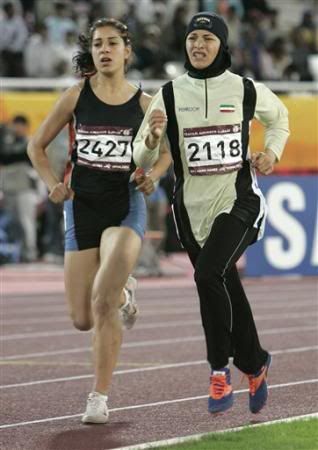 Iran's Mina Porseifi Jahankhanomlou at the back of the pack of the 1500m finals. I *heart* her top. I've looked high and low for a slightly longer sports top and have always come up empty.
Iran's Mina Porseifi Jahankhanomlou at the back of the pack of the 1500m finals. I *heart* her top. I've looked high and low for a slightly longer sports top and have always come up empty.Monday, December 11, 2006
Burnt Out & Scripting "Terrorism"
But, that doesn't mean I still don't like to read a good politically oriented piece in the muslim blogosphere. And alhamdulilah, we have some excellent commentators out there. It's unfortunate that their voices aren't heard by a wider audience.
ThePolemicist has an excellent commentary on what he calls "The Ghettoest Terror Plot in History" where a supposed lone wolf plotted to grenade bomb a mall in Illinois. Excellent excellent excellent.
And so what this becomes is the most ghetto terror plot in history. Shareef is a broke ass punk. Even his sister won't lend him money. And so, in order to keep this thing moving, CS is most likely the one who proposed that Shareef sell his ghetto stereo speakers (the affidavit says CS and Shareef discussed it, but we know what that really means). Wait, let me guess what Plan C was—getting the grenades on layaway??
Clearly the government agent is simply groping for a way for Shareef to continue with this "plot." Broke. No access to cash. So they settled on the one barterable good the guy has. Stereo speakers! And they're gonna get with those speakers? 4 grenades and 2 hand guns??? But CS said the grenades were $50 each. So that means the grenade set cost $200. What do the guns cost? Maybe $100 each? What about bullets? So that's at least $300. Do you seriously think that broke ass Shareef's speakers are worth $300??
Now this gets even more cartoonish. This is a caricature of previous terrorist plots. Shareef and CS talked the day earlier about shaving their pubes, a supposed rite among Muslim terrorists before they attack. Now they make their 'martyrdom' videos. Haha, what bullshit man. Whose idea was this? The affidavit doesn't mention this. Moreover, how did they get the camcorder? Do you think broke ass Shareef had one? Shareef makes some speech, seems like it's written by CS. None of the ghetto talk and cussing in it. Seems like a textbook speech.
Saturday, December 9, 2006
Global Peace and Unity event
Friday, December 8, 2006
Reflection of Pearls
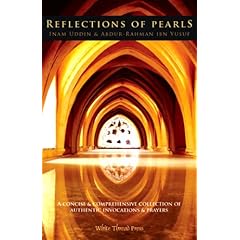 One of the best books I've bought pertaining to Islam (and I've bought dozens), is Reflections of Pearls. It is by far my favorite dua book. It contains everyday supplications, a comprehensive section on supplications from the Qur'an and Sunnah, as well as a very thorough section describing prayers outside the fard salat.
One of the best books I've bought pertaining to Islam (and I've bought dozens), is Reflections of Pearls. It is by far my favorite dua book. It contains everyday supplications, a comprehensive section on supplications from the Qur'an and Sunnah, as well as a very thorough section describing prayers outside the fard salat.Each arabic entry is followed by an excellent transliteration into the roman (ie western, european) alphabet and translation into english. So, for someone who's arabic isn't the best, they can (attempt to) read the arabic, follow up with a reading of the transliteration and finish with a reading of the translation. The dua is said three times, engraining it in your mind, heart and soul.
inshaAllah I'll put up duas from the book on occasion, although I don't know if I'll be able to type out the arabic.

Thursday, December 7, 2006
Beads and Remembrance
 When I was little, I was secretly jealous of my catholic friends' rosaries. I guess Lutherans have rosaries too, and the ELCA apparently even has some prayers suggested for it, but it was never something that was part of my family's faith tradition, or even the traditions of the churches we went to. I can't really tell from the postings I've found, but it would seem that at least the ELCA rosary is a relatively new thing, which may explain why I never saw it in church.
When I was little, I was secretly jealous of my catholic friends' rosaries. I guess Lutherans have rosaries too, and the ELCA apparently even has some prayers suggested for it, but it was never something that was part of my family's faith tradition, or even the traditions of the churches we went to. I can't really tell from the postings I've found, but it would seem that at least the ELCA rosary is a relatively new thing, which may explain why I never saw it in church.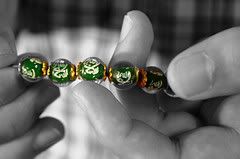 When I began my spiritual journey in college, one of the first things I did was go out and buy a book on prayer beads that came with a string of 108 sandelwood beads. I flipped through the book and eagerly held the beads in my hand...and nothing. I didn't know what to say. The catholic rosary held no appeal to me. Nor did the buddhist mala. I had nearly lusted after beads my entire life, and when I had them in my hand, nothing.
When I began my spiritual journey in college, one of the first things I did was go out and buy a book on prayer beads that came with a string of 108 sandelwood beads. I flipped through the book and eagerly held the beads in my hand...and nothing. I didn't know what to say. The catholic rosary held no appeal to me. Nor did the buddhist mala. I had nearly lusted after beads my entire life, and when I had them in my hand, nothing.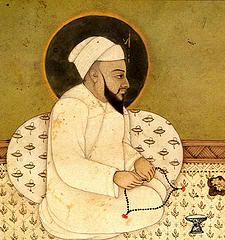
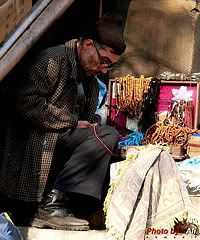 Now when I pick up one of my sets of prayer beads and let them slide through my fingers, my tongue knows what to do:
Now when I pick up one of my sets of prayer beads and let them slide through my fingers, my tongue knows what to do:سُبْحَانَ اللّهِ وَ بِحَمْدِهِ
SubhanAllahi wa biHamdihi
Glory be to Allah and I Praise Him
Glory be to Allah, All Praise is for Allah, There is No God but Allah, Allah is the Greatest, There is no might or any power Except with Allah
لا اِلهَ اِلَّا اللّهُ
La illaha ilAllah(u)
There is No God But Allah
This website has some excellent articles on dhikr that I refer to constantly. Unfortunately, geocities gives their sites limited bandwith, so if it doesn't load, try again later. It's well worth it.
For more indepth explanation of dhikr from a traditional sunni perspective, visit this page at sunnah.org.
Dhikr of Allah is the most excellent act of Allah's servants and is stressed over a hundred times in the Holy Qur'an. It is the most praiseworthy work to earn Allah's pleasure, the most effective weapon to overcome the enemy, and the most deserving of deeds in reward. It is the flag of Islam, the polish of hearts, the essence of the science of faith, the immunization against hypocrisy, the head of worship, and the key of all success.There are no restrictions on the modality, frequency, or timing of dhikr whatsoever. The restrictions on modality pertain to certain specific obligatory acts which are not the issue here, such as Salat. The Shari`a is clear and everyone knows what they have to do. Indeed, the Prophet said that the People of Paradise will only regret one thing: not having made enough dhikr in the world! Are not those who are making up reasons to discourage others from making dhikr afraid of Allah in
this tremendous matter?
Allah says in His holy Book: "O Believers, make abundant mention of ALLAH!" (33:41) And He mentions of His servants "Those who remember their Lord standing, and sitting, and lying on their sides" (3:191), in other words at all times of the day and night. He said (3:190-191): "The creation of heaven and arth and the changes of night and day are signs for people who have wisdom: -- consider who is described as having wisdom -- Those who remember (and recite and call) Allah standing up, sitting, and lying on their sides." `A'isha said, as narrated by Muslim, that the Prophet mentioned/remembered Allah at all times of the day and night.
The Prophet said: "If your hearts were always in the state that they are in during dhikr, the angels would come to see you to the point that they would greet you in the middle of the road." Muslim narrated it. Imam Nawawi in his Sharh sahih muslim commented on this hadith saying: "This kind of sight is shown to someone who persists in meditation (muraqaba), reflection (fikr), and anticipation (iqbal) of the next world."
Wednesday, December 6, 2006
Nawawi Foundation

The Nawawi Foundation is a small, educational organization in Chicagoland that provides islamic teachings grounded in tradition, while remaining revelant in the modern world. For those of us not lucky enough to take courses, the Foundation organizes fantastic looking trips each year to a different part of the real life muslim ummah. It's one of those things on my to do list.
Tuesday, December 5, 2006
The Pen and the Ink Pot
Now, I'm a big fan of the traditional stuff. Kufic, thuluth, riqa, it's all good. But, there is some stuff out there online that just blows my mind. Check the Pen and the Inkpot. SubhanAllah!

Surah al Fatiha
Yusuf Islam
But, out of everything he has done as Cat Stevens and Yusuf Islam, it is this video from a celebration of the Prophet's birthday in Abu Dhabi.
I think these songs appeal very strongly to me because they mix the traditional muslim style of nasheed with a more western, almost a gather around the campfire feel.
National Geographic's Inside Mecca
National Geographic has produced an excellent documentary on Hajj called Inside Mecca, just one of the many islam themed videos available for free online.
This video provides an insider's view of the hajj and can be especially insightful for non muslims. It's an excellent little dawah piece, easily accessable and easy to understand.
Videos
I have a list a mile and a half long of my favorite online islam related videos that I'll be putting up periodically. Islam related videos are some of my favorite things in the online ummah.
Monday, December 4, 2006
Podcasting
 I was gifted with a beautiful iPod nano in honor of the completion of my paralegal certification, forthcoming in 2 weeks. This has opened up a whole new segment of the online ummah to me - podcasting. In addition to traditional islamic downloads like the Qur'an and lectures in mp3 format, several ingenius brothers and sisters have created excellent weekly/occasional audio files available for download on a variety of subjects. I've stuffed my 2 gig beauty full to the gills, and still have more lectures and quran waiting in iTunes.
I was gifted with a beautiful iPod nano in honor of the completion of my paralegal certification, forthcoming in 2 weeks. This has opened up a whole new segment of the online ummah to me - podcasting. In addition to traditional islamic downloads like the Qur'an and lectures in mp3 format, several ingenius brothers and sisters have created excellent weekly/occasional audio files available for download on a variety of subjects. I've stuffed my 2 gig beauty full to the gills, and still have more lectures and quran waiting in iTunes.Currently on my iPod:
The Qur'an - I've got probably 15 full recitations of the Qur'an by different people on cd. Choosing at random, I've uploaded Zaki Daghistani. I think I may upload Abdul Baset next, but I'm not sure.
Qur'an Weekly Podcast - A portion of the Qur'an made available each week for download, with arabic and english recitations. Perfect for the non arabic speaking muslim on the go.
Mecca One Radio - recordings of an excellent muslim radio show out in California. Their website has the programs available to listen to online.
Somewhat on a tangent, they used to sell awesome iPod parody shirts. I never got a chance to order one. *sigh* One of their designs is at the beginning of this post. Scroll through the gallery at deenport for a thumbnails of 2 others.
AlHambra Productions - from the folks at Zaytuna Institute. These guys always have something brilliant to say subhanAllah.
Radical Middle Way - Search for it on iTunes. If youre not lucky enough to live in England so that you can hear these amazing talks in person, they're also available on their website.
Waiting to go on my iPod:
ADAMS Qurtaba Institute
Ihsan
altMuslim
Any suggestions for other good islam related podcasts? Since I've gotten my iPod, my commute to work (one hour each way) and and my workday have seemed much more fruitful. Stressed? Plug in the headphones and there's the quran, at my fingertips.
Friday, December 1, 2006
The Qur'an
 I ordered my first Qur'an, an A.J. Arberry translation, from Half.com in the summer of 2001. But, I got impatient, and rather than wait for it to arrive, I went out and bought a Shakir translation from the local new age store, hehe. Both Qur'ans still reside on the top shelf of my religious books bookcase, along with nearly a dozen other Qur'ans I've aquired over the years.
I ordered my first Qur'an, an A.J. Arberry translation, from Half.com in the summer of 2001. But, I got impatient, and rather than wait for it to arrive, I went out and bought a Shakir translation from the local new age store, hehe. Both Qur'ans still reside on the top shelf of my religious books bookcase, along with nearly a dozen other Qur'ans I've aquired over the years.
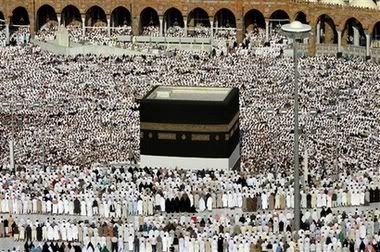
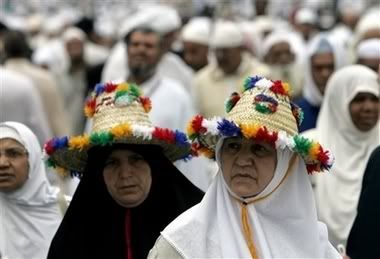
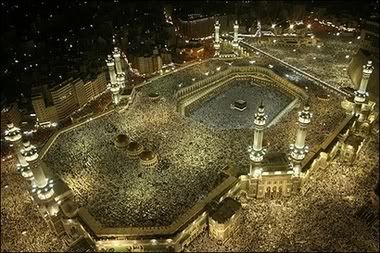



.gif)
.gif)














